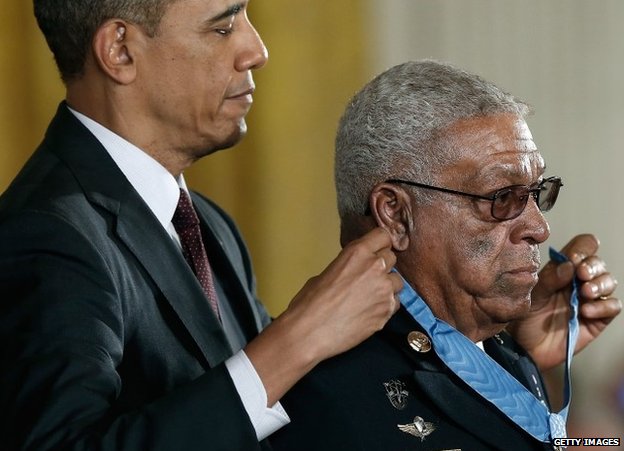Better late than never: 24 minority veterans receive America’s highest honor
Had it not been for their ethnicity or skin color, 24 soldiers who served in either Vietnam, Korea or World War II would have received their nation’s most prestigious medal—the Medal of Honor—decades ago.
On March 19, President Barack Obama received three veterans at the White House, the only ones still alive among the 24 soldiers now honored for their service.
“No nation is perfect, but here … we confront our imperfections and face a sometimes painful past, including the truth that some of these soldiers fought and died for a country that did not always see them as equal,” said President Obama.
Of the few who survived, such as retired Sergeant First Class Melvin Morris, the news that they would receive the medal of honor was unexpected. Morris, now 72, had already been awarded the Army’s Distinguished Service Cross in 1970, the country’s second-highest commemoration of military duty. However, after thorough review, it became clear that Morris’ actions deserved an even higher form of recognition.
Melvin Morris first joined the army in 1942 at the age of 19 and ended up serving a total of 22 years. On one occasion was on a field mission with his company when he learned the commander of a different company nearby had been shot and killed.
“Immediately it came to me that I had to recover his body,” Morris said. “…Leave no man behind under any circumstance.”
Morris ran through the cross-fire to his commander and retrieved the body. Then, he went back to retrieve crucial documents that had fallen on the field when the battle began. Morris was shot three times—in the finger, arm and chest—as he successfully brought back the papers.
The veterans’ award came after a 12-year process. In 2002, the U.S. Congress—as part of the Defense Authorization Act—formed a committee to review Hispanic and Jewish veterans “to ensure those deserving the Medal of Honor were not denied because of prejudice,” said the White House. Later on, the congressional act was expanded to investigate any serviceman or woman who might have been denied the award due to discrimination.
Originally, the Medal of Honor was only given within three years of the noble act; however, this was also reviewed recently after considering the case of Captain Emil Kapaun, an Army chaplain and Catholic priest, who saved various lives of fellow U.S. soldiers before being taken hostage and dying in a North Korean prison camp in 1951.
Of those awarded the medal less than a week ago, five are Vietnam veterans, nine Korean War veterans, and seven World War II veterans given the award posthumously. Included in this group is Leonard Kravitz, an assistant machine gunner in the Korean War, who was also the uncle of rock musician Lenny Kravitz. The widow of Specialist Leslie Sabo was also given the honour by the President 40 years after his original recommendation was lost.
Who knows how many more could still receive the award? At least now the U.S is trying to correct its wrongs, one veteran at a time.
Sources: cnn.com, bbc.com

Annie Bananie, as she is known in her kindergarten gang, has been with The Talon for two years now. She has always been in the News section, which, as...










